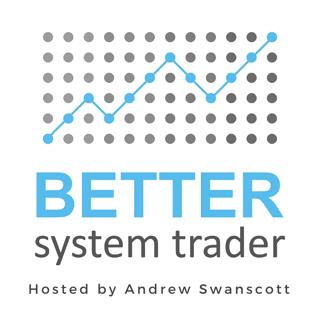
018: Scott Andrews 'The Gap Guy' talks all about Gaps, why they work, how to pick the best Gaps and avoid the worst, Gap Zones and setting stops and targets. PLUS we discuss a concept called 'Ensemble Systems' that may just change the way you view trading
Scott Andrews 'The Gap Guy' shares his expertise in gaps, why they work, what factors to take into account when trading gaps and what to avoid. We also discuss gap zones, when to fade and when to follow and calculating stops and targets. PLUS, for those that aren't into Gap trading, we cover some important concepts that can impact all styles of trading, include one concept called 'Ensemble Systems' which may just change the way you look at trading strategies. Topics discussed Why it's important to trade a style that matches your own strengths rather than follow someone else Why gap trading works Markets where gaps work best and those that don't The best type of stocks to trades gaps and the stocks to avoid The benefits of trading gaps in indices vs stocks The 3 market conditions to look at when analysing a gap How seasonality impacts gap trading Signs of gaps to avoid Using ATR to determine the probability of gap size closing Gap zones and how the location of the gap can provide useful information The worst performing gap zone The psychology of certain gap zones and why some work better than others When to fade the gap and when to follow it Calculating stop and profit levels based on gap characteristics and market conditions How to determine if a target should be a full gap close, partial gap close or an extended target past gap close The impact of QE on gaps How to combine systems into Ensemble Systems for an interesting view on trading strategies Disclaimer: Trading in the financial markets involves a substantial risk of loss and is not suitable for everyone. All content produced by Better System Trader is for informational or educational purposes only and does not constitute trading or investment advice. Past performance is not necessarily indicative of future results.
3 Aug 201550min

017: Jerry Parker from the original Turtles trading group shares 30+ years of trading experience in trend following and systematic trading.
Jerry Parker, Turtle Trader and CTA, talks about trend following, how to approach wins and losses, dealing with drawdowns, managing correlations in asset classes and how changing market dynamics have impacted trend following and the solution. He also gives us some tips on systematic trading including how he trades without relying on optimal values of the past. Topics discussed What types of characteristics Dennis and Eckardt were looking for in the Turtle traders program How the Turtles were taught to approach losses Common traits amongst the most successful Turtles The hardest part of trading as a Turtle How Jerry overcame the fear of taking trades The biggest lesson being a Turtle What Jerry did with the Turtles approach after the program ended The impact managing other peoples money can have on trading The key factors that make trend following work Managing correlations between asset classes Long-term vs short-term trend following Dealing with drawdowns How changes market dynamics have impacted trend following and solutions How to diversify to lessen the impact of any one parameter How to trade without relying on optimal values of the past PLUS questions submitted by listeners: The difficulties in knowing when to adjust strategy parameters Adjusting your system for whipsaws Tips to avoid data mining Do the Turtles systems still work in the todays markets? Are there any markets where the strategies no longer work? Short versus Long trades Overcoming emotions in trading Biggest mistakes and the lessons learnt What todays Turtle program would look like Disclaimer: Trading in the financial markets involves a substantial risk of loss and is not suitable for everyone. All content produced by Better System Trader is for informational or educational purposes only and does not constitute trading or investment advice. Past performance is not necessarily indicative of future results.
27 Jul 201554min

016: Trading champion Andrea Unger provides tips to creating robust strategies, indicators in trading, Forex trading and optimising to understand market behaviour.
World Cup Trading champion Andrea Unger discusses how to create robust strategies, the role of indicators in trading, principles to strategy creation, Forex trading strategies and optimising to understand market behaviour. Topics discussed The strategies and position sizing Andrea used to win the world cup trading championship 4 times The role of luck in trading Controlling risk when trading multiple strategies Where to find trading ideas The principles Andrea uses in the Forex and Futures markets to develop profitable strategies The role of indicators in strategy development Matching strategy type to market characteristics Why you should analyse your biggest winners as well as your biggest losers Forex trading tips and changes in the Forex market Using longer timeframes to filter trades in shorter timeframes When to optimise or tweak a strategy and how to ensure you don't over-optimise The drawbacks of trend following and the solution Tips to handling drawdowns Intraday vs End-of-day trading The key to trading success. Disclaimer: Trading in the financial markets involves a substantial risk of loss and is not suitable for everyone. All content produced by Better System Trader is for informational or educational purposes only and does not constitute trading or investment advice. Past performance is not necessarily indicative of future results.
20 Jul 20151h 8min

015: Stuart McPhee talks about the single biggest factor to trading success, common mistakes and the counter-intuitive side to trading, plus tips to improve discipline
Stuart McPhee discusses the common mistakes traders make, the single biggest factor to trading success, the counter-intuitive side to trading and tips to improving trading discipline. Topics discussed Why trading can be simple but not easy Common mistakes traders make Factors to consider when choosing a trading strategy that suits you Common Money Management mistakes The single biggest factor to trading success Common mindset issues traders experience Tips to improving discipline and changing trading behaviour How the Petronas towers can be applied to trading The counter-intuitive side to trading The Chinese Bamboo story Disclaimer: Trading in the financial markets involves a substantial risk of loss and is not suitable for everyone. All content produced by Better System Trader is for informational or educational purposes only and does not constitute trading or investment advice. Past performance is not necessarily indicative of future results.
12 Jul 201538min

014: Rande Howell discusses issues limiting trader performance, the impact of emotions, managing process not outcome and tips to improve trading performance.
Performance coach Rande Howell discusses the most common issues limiting trader performance, the impact of emotions on trading, the importance of managing process not outcome and tips on changing our physiology to improve performance. Topics discussed The most common issues impacting trader performance What causes hesitation when taking trades How to calm the emotions when trading An easy way to monitor changes in emotions The impact of breathing on emotions and trading A simple trick to disrupt fear Patience and boredom in trading and how to overcome them Are you an African Lion or an American Cougar when trading? Personal traits that don't align well with trading success How successful traders handle drawdowns The stage in a traders journey where performance coaching provides the most value What successful traders need to watch out for to continue operating at their peak How overconfidence and euphoria can destroy your trading Tips for getting prepared for the trading session Disclaimer: Trading in the financial markets involves a substantial risk of loss and is not suitable for everyone. All content produced by Better System Trader is for informational or educational purposes only and does not constitute trading or investment advice. Past performance is not necessarily indicative of future results.
5 Jul 20151h 14min

013: Hedge fund manager Andreas Clenow discusses cash vs risk allocation, position rebalancing and why traditional trend following doesn't work in stocks.
Andreas Clenow is a hedge fund manager who specialises in developing and trading quantitative strategies across all asset classes. Before joining the hedge fund world by establishing his own hedge fund he maintained Global Head positions at Reuters and Equis International. He is the author of two books, the first being international best seller 'Following the Trend' and the second 'Stocks on the Move' has just been released. In this episode Andreas talks about trend following in stocks, why traditional approaches don't work and what you can do to account for this. We also talk about trading concepts, cash vs risk allocation, position rebalancing and building robust strategies. Topics discussed The origins of trend following and why a traditional trend following approach doesn't work on stocks Why it's a bad idea to think in terms of cash allocation and the solution Position rebalancing, why, how and when How hedge funds look at position sizing compared to retail traders Why pyramiding positions doesn't make sense How to get a more realistic understanding of performance results than just a backtest report can provide How a random number generator can beat the mutual funds How to ensure you strategies are robust and not curve-fit Handling large losses or periods of drawdown The role of critical thinking in trading Disclaimer: Trading in the financial markets involves a substantial risk of loss and is not suitable for everyone. All content produced by Better System Trader is for informational or educational purposes only and does not constitute trading or investment advice. Past performance is not necessarily indicative of future results.
29 Jun 201548min

012: Ernest Chan talks quantitative trading, momentum, stop losses, minimising drawdown and maximising returns, automated trading and competing with the big firms
Dr Ernest Chan talks about many aspects of quantitative trading, including how market crises impact momentum strategies and how to manage the impacts, when to use stop-losses and when they don't make sense, automating trading, managing funds in a portfolio of strategies and a simple money management approach which aims to limit drawdowns while maximising returns. Topics discussed Where to find trading ideas The first aspect of a market to identify before building a strategy for it Momentum crashes and the performance of momentum strategies after a financial crisis How to manage the times when momentum strategies aren't working When stop losses should be used and when they don't make sense How to limit drawdowns while maximising growth Factors to consider when automating your trading How independent traders can avoid competing with the big trading firms When you need to worry about market microstructure and when it doesn't matter Managing funds for a multi-strategy portfolio The hardest part of trading Disclaimer: Trading in the financial markets involves a substantial risk of loss and is not suitable for everyone. All content produced by Better System Trader is for informational or educational purposes only and does not constitute trading or investment advice. Past performance is not necessarily indicative of future results.
21 Jun 201549min

011: Ralph Vince talks position sizing, the different applications of optimalf, trading horizon, diversification and his changing views over 25 years.
Ralph Vince talks about position sizing, how to choose a position sizing model that suits you, optimalf, the curve and how it can be used for maximum growth and other applications. The risk of multiple strategies in a portfolio and how to manage it, dynamic position sizing, martingale strategies and how Ralphs views on money management has changed in the past 25 years. Topics discussed The single biggest factor in trading which is also probably the most overlooked The most important factor when determine position sizing How horizon impacts position sizing How Optimalf is only one point on the curve and other critical points you also need to consider Traversing the curve and how it applies to your trading criterion How to manage a portfolio of multiple strategies The risk of multiple strategies and how to manage it Trading the equity curve Dynamic position sizing When Martingale strategies make sense How Ralphs views on money-management have changed in the past 25 years Disclaimer: Trading in the financial markets involves a substantial risk of loss and is not suitable for everyone. All content produced by Better System Trader is for informational or educational purposes only and does not constitute trading or investment advice. Past performance is not necessarily indicative of future results.
14 Jun 20151h 3min





















